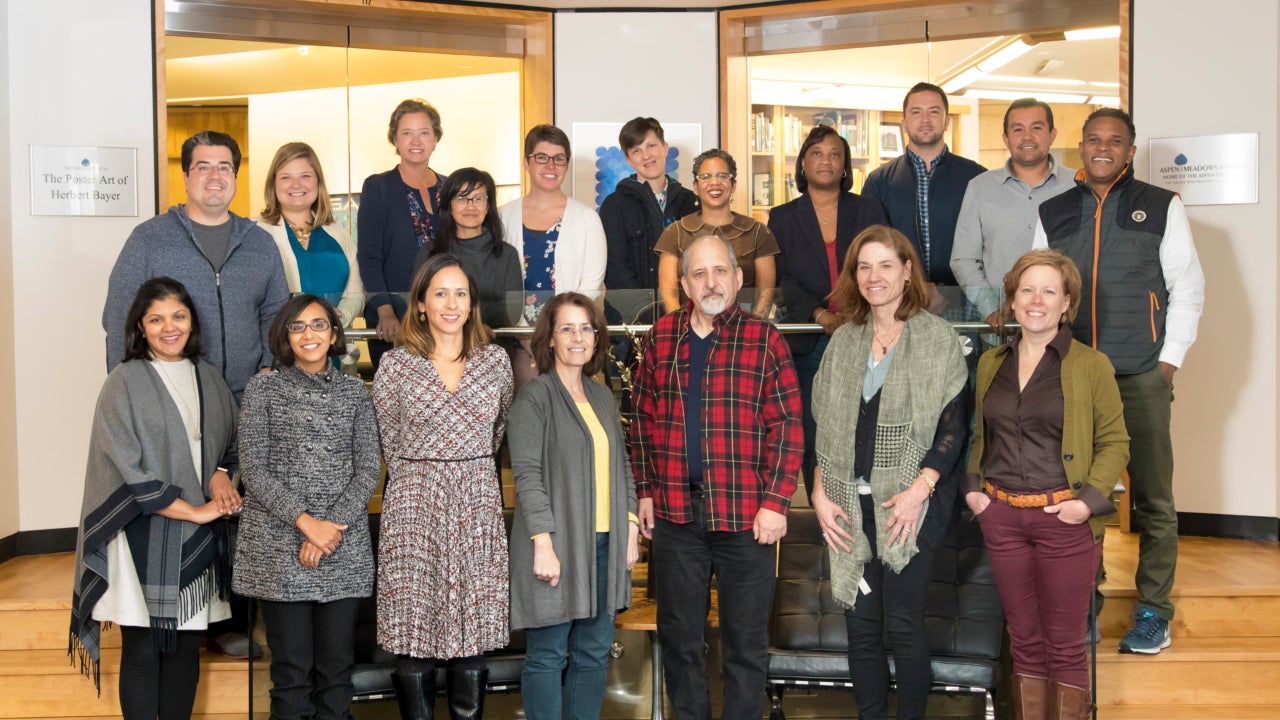Job Quality Fellow, Class of 2017-18
Director of Social Responsibility & Community Sustainability
San Francisco International Airport

Why is job quality important to the San Francisco Airport?
SFO’s mission is to be an exceptional airport in service to our communities. We believe that we have a responsibility to the communities we serve, and we work hard to maximize the social and economic impact and benefits that SFO provides. SFO is a major job center and economic engine, and we know that an inclusive and cohesive Airport community spurs innovation and strengthens our business operations, enabling us to better anticipate and respond to the needs of our passengers.
We have cultivated outreach to diverse job seekers and local small businesses and worked to establish and maintain premium job quality in all aspects of our operations for many years. We started thinking about the issue of job quality over two decades ago when our former Airport Director first stepped into the role. He would do rounds across the Airport to see how things were running and noticed that workers were sleeping in the stairways. When he looked into it, he found that people were working two or three jobs at very low wages and were trying to catch a few hours — or minutes — of rest before they went to their next shift. His observations planted the seed for our job quality focus at SFO.
SFO was the first airport in the country to improve its worker retention rate by implementing a formal policy to ensure Airport staff in safety and security roles were paid a competitive minimum wage and received a variety of other benefits, including health care, paid time off, and sick leave. Under the leadership of our current Airport Director, we continue to use our unique role as a landlord, government agency, and regulatory authority to influence the actions of the businesses that work in the airport. We know that paying living wages and creating safe, secure, and positive working conditions directly improves job performance and makes the Airport more profitable.
Focusing on job quality is a shared value for us at the Airport. Broadly, we operate under three main priorities: (1) instilling a culture of health and safety so that everyone who comes to work goes home safe; (2) providing quality wages, benefits, and positive working conditions across all Airport employers; and (3) promoting a work climate that supports wellness, motivates performance, and fosters shared ownership and accountability. We believe that strengthening our communities creates both social and economic value. Vibrant communities support business growth, which, in turn, creates additional opportunities from which our communities will benefit.
What is SFO doing to improve job quality within the airport?
The aviation industry, unfortunately, reflects the same income disparities that we’ve seen develop nationwide in recent decades. There is now a huge difference between salaries at the executive levels compared to what people on the front line are making. Increasingly, there seems to be fewer opportunities for upward mobility.
As the seventh busiest passenger airport in the United States, SFO is a major regional economic engine. In 2017, we served over 55 million passengers, generating $8.4 billion in on-site economic activity and supporting nearly 43,000 jobs. SFO is a “little city” with our own police force, fire department, and even a wastewater treatment plant. We host a wide breadth of diverse employment and business opportunities, from airlines and their ground handling companies, to construction and facilities management, to retail, food, and beverage concessions, and many more. There are many different types of jobs at the Airport, but, in some of these jobs, we also see a lot of turnover. Running an airport is a national and an international security concern, and worker turnover undermines our safety and security priorities.
A lot of the work that we do at SFO is to ensure worker retention by improving working conditions. While these efforts help meet the business needs of the Airport, we also know that they help meet the personal needs of the workers by enabling them to stay in good jobs and advance within their careers. With the Bay Area being one of the most expensive places to live in the country, it is incredibly important for our workers to be able to afford to live here. Not only is it a critical equity issue, but it’s a crucial business need. We cannot run the Airport without our workers.
One of our landmark job quality initiatives at SFO is the Quality Standards Program (QSP). Introduced in 2000, the QSP created recruitment, training, compensation, and performance standards above and beyond those set by the Federal Aviation Administration. These standards, adopted and approved by the Airport’s Commission, govern all jobs in security areas, or those positions that perform security functions, as well as airline catering employees. Employers covered by the QSP program undergo certification before they can initiate operations at the Airport. There is also an annual review process and SFO may audit companies for compliance and investigate complaints at any time. Wages are tied to the San Francisco Minimum Compensation Ordinance (MCO), ensuring covered employees will always make a certain amount above the minimum wage. Employees also receive paid sick leave, personal leave, and health benefits free of premiums.
The QSP is one of the largest and most successful living wage experiments in the country. Shortly after its implementation, UC Berkeley’s Labor Studies Center performed an independent evaluation. Their study showed that workers were not only staying in their jobs longer, but productivity and morale were also improving. We also learned that companies were actually saving money, even though they were paying more in wages! The reduction in turnover and the increase in productivity far outweighed the wage hike.
Describe the experience and perspective you bring to the Job Quality Fellowship.
I have almost twenty years of experience in workforce development, both in the nonprofit and public sectors. My experience as a direct service provider, program implementer, policymaker, and regulator allow me to bring in a range of perspectives from the workforce development ecosystem. In my current role at SFO, I have the opportunity to address the whole spectrum of economic prosperity: from workforce education and training, to small business development, to financial sustainability and asset-building, to policies that support job quality. The programs I oversee work to level the playing field so that job seekers and small business owners can have equitable access to the economic opportunities at SFO and thrive once they are here. Because of the diversity of employment and business opportunities at the Airport, SFO is uniquely positioned to provide both a solid point of entry for workers of all skill levels, as well as opportunities for career advancement and economic mobility.
What are SFO’s goals in the next few years as they relate to improving job quality?
There are three core areas related to job quality that SFO is currently pursuing. First, we want to continue to build out our performance management system to better understand the impacts of our policies and practices as they relate to job quality. This will allow us to continuously improve our regulatory framework and our services to employers and employees.
Second, we want to grow and nurture SFO’s talent pool of both workers and small businesses through continuous training, leadership development, and advancement opportunities. We are also closely monitoring how automation may disrupt jobs at the Airport, and we want to ensure that our current and future workforce can adjust to these advancements.
Third, we want to continue to implement programs, policies, and activities that advance job quality Airport-wide and also enable employees to build assets and achieve financial stability. We want Airport employers to treat regulation as the floor rather than the ceiling. We will continue to push for higher wages and promote employee offerings and incentives that create a fair and engaged workplace, including stable and predictable scheduling. We also hope to establish a Financial Security Program for employees that offers tools and supports to increase economic mobility and decrease financial stress. This includes supporting the development of benefit packages that facilitate a healthy, stable life and make employees less vulnerable to negative effects of unexpected life events.
What do you hope to learn and achieve through the Job Quality Fellowship?
I hope to learn more about the innovative work that is happening around the country to advance job quality for lower-income workers. As a “little city,” I think the Airport can be a laboratory for piloting new job quality initiatives and for developing strategies to scale and sustain efforts. I’m also particularly interested in learning more about how the Airport, as a public entity, can partner with both the labor movement and business community on a shared vision for job quality. All three of these sectors are represented in our Job Quality Fellowship cohort. I’m excited about the safe space that the Fellowship provides for authentic dialogue and real problem-solving.
I hope to achieve increased job quality at the Airport as a result of the Fellowship, but I’m also excited about what this inaugural class of Job Quality Fellows can achieve collectively. While the Fellows come from different parts of the country with different priorities and perspectives, we all share an urgency to create more quality jobs, promote economic mobility for workers, and sustain thriving communities. These are very ambitious goals, and we need to leverage our sense of urgency to achieve national awareness of both job quality problems and possible solutions. I think we will all come out of the fellowship well positioned to achieve great impacts in our local communities. Together, I hope we can contribute to a roadmap for an economy that works better for communities across the country.
Share now
Tweet “We have a responsibility to the communities we serve, and we work hard to maximize the social and economic impact and benefits that SFO provides.” -Emylene Aspilla
Tweet “We want Airport employers to treat regulation as the floor rather than the ceiling. We will continue to push for higher wages [and] incentives that create a fair and engaged workplace.” -Emylene Aspilla
Tweet “Together, I hope we can contribute to a roadmap for an economy that works better for communities across the country.” -Emylene Aspilla
Keep in touch
Learn how EOP is helping low- and moderate-income Americans connect to and thrive in a changing economy. Sign up to receive news about the Job Quality Fellows and other announcements via email.
We are grateful to the Ford Foundation and The Prudential Foundation for their support of this work.
